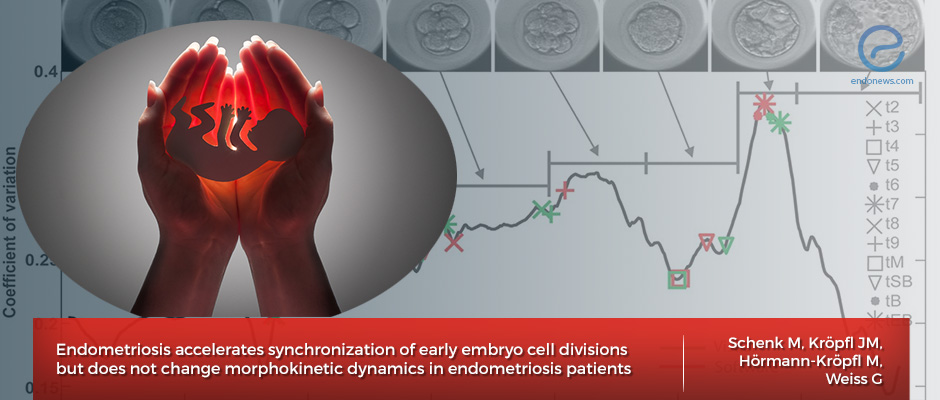Impact of Endometriosis on Embryo Development
Sep 2, 2019
Endometriosis accelerates synchronization of early embryo cell divisions but does not change morphokinetic dynamics in endometriosis patients
Key Points
Highlight:
- Dr. Weiss group from Austria reported for the first time that endometriosis accelerates synchronization of the embryo cell cycle, but not the embryo morpho-kinetics.
Background:
- Endometriosis affecting about 10% of women in reproductive age is one of the factors to causes infertility.
- The mechanism and the pathology of infertility affected by endometriosis are largely unknown.
- Many studies have been suggested that endometriosis is associated with unfavorable conditions for fertility such as impaired fertilization, elevated oxidative stress, and higher spindle abnormalities.
- However, there is a higher risk of miscarriage in endometriosis patients even in assisted reproductive technology-applied fertility.
- Therefore, it is important to understand how endometriosis affects embryo development, especially for morpho-kinetics timing.
Key points:
- From Bonferroni-corrected group comparisons, embryos of endometriosis patients showed similar absolute morpho-kinetic parameters as the control group.
- According to the dynamic monitoring of embryo development, there is no significant difference between endometriosis and the control group in most of the time.
- However, during early embryo cell divisions, embryos from endometriosis patients have faster synchronization than the embryos from the control group.
- In terms of embryo cleavage, there is no clear association between the embryos from endometriosis patients and healthy women.
Conclusions and limitations:
- Based on this finding, endometriosis expedites synchronization of early embryo cell divisions within the second cell cycle.
- However, the absolute morpho-kinetic variables are not different from endometriosis patients and control group.
- As there is a big heterogeneity in this research, further investigations which incorporate more factors are necessary to confirm this finding.
Lay Summary
Endometriosis is a hormone-dependent disorder which affects approximately 10% of women in reproductive age. There are many endometriosis-related problems, but infertility is one of the well-known issues which should be handled and understood. Despite numerous trials, the mechanisms and pathology of how endometriosis specifically leads to infertility are largely unknown. Therefore, more investigations are required for a better understanding.
Several studies have been suggested that endometriosis is associated with unfavorable conditions for fertility such as impaired fertilization, elevated oxidative stress, and higher spindle abnormalities. Interestingly, more recent studies suggested that endometriosis is also affected on assisted reproductive technology-applied fertility though this is still controversial. However, it seems less controversial that there is a higher risk of miscarriage in endometriosis patients but no one knows exactly how it works.
Therefore, it is important to understand how endometriosis affects embryo development. In this study, Dr. Weiss group from Austria reported for the first time that endometriosis accelerates synchronization of the embryo cell cycle, but not the embryo morpho-kinetics. This study recently published in the journal of “PLOS ONE”.
For this study, a total of 1148 embryos were analyzed. 552 embryos are from 86 endometriosis patients, and 596 embryos were obtained from 77 healthy women. Firstly, there were no significant differences in major criteria such as patients’ age, BMI, retrieved oocytes/cycle, transferred embryos/cycle and implanted embryos/cycle between the endometriosis and the control group.
Next, morpho-kinetics and variables of dynamic monitoring of embryo development were measured. Statistical comparisons revealed that embryos of endometriosis patients showed similar absolute morpho-kinetic parameters as the control group. According to the dynamic monitoring of embryo development, there is no significant difference between endometriosis and the control group in most of the time. However, during early embryo cell divisions, embryos from endometriosis patients have faster synchronization than the embryos from the control group. In terms of embryo cleavage, there is no clear association between the embryos from endometriosis patients and healthy women.
Based on this finding, the authors concluded that endometriosis expedites synchronization of early embryo cell divisions within the second cell cycle. However, the absolute morpho-kinetic variables are not different from endometriosis patients and control group. As there is a big heterogeneity in this research, further investigations which incorporate more factors are necessary to confirm this finding.
Research Source: https://www.ncbi.nlm.nih.gov/pubmed/?term=31369616
Endometriosis Embryo development Embryo morphokinetics Cell cycle synchronization

